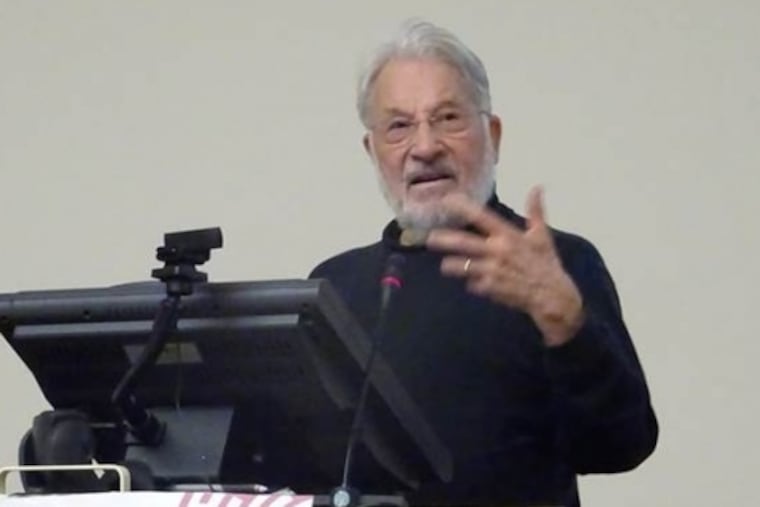Klaus Krippendorff, celebrated expert on human-centered design and content analysis, and Penn professor emeritus, has died at 90
He spent nearly six decades in Philadelphia, and his pioneering research advanced knowledge in political science, psychology, computer science, machine learning, and other disciplines.

Klaus Krippendorff, 90, of Philadelphia, renowned expert on human-centered design and content analysis, Gregory Bateson professor emeritus of communication at the University of Pennsylvania, lecturer, author, builder, sculptor, and activist, died Monday, Oct. 10, of lymphoma at the Hospital of the University of Pennsylvania.
Large-minded, prolific as a researcher and author, and diverse in his many achievements, Dr. Krippendorff advanced the notion that communication, especially language, shapes reality. He connected theories of communication, design, and cybernetics, and his work influenced how countless psychologists, social scientists, designers, and advertisers communicate and create.
“Because I could jump from one to the other [discipline], that made me a productive contributor to all,” he said in an oral history video for Penn. In a tribute, his family said: “He sought to create beauty through randomness and find the symmetry within chaos.”
He created Krippendorff’s alpha in the late 1960s, a complex mathematical formula that measures the agreement among observers or instruments during statistical analysis and became the standard to ensure reliable research.
He joined Penn in 1964 as a predoctoral research fellow, became associate professor in 1970, and full professor in 1980. He was named Gregory Bateson professor for cybernetics, language, and culture in 2000, and professor emeritus in 2010.
He was the first faculty member at Penn to hold a doctorate in communication, and, with 58 years at the Annenberg School for Communication, is the longest-tenured faculty member in school history. He created popular new classes, directed countless workshops and symposia, lectured and taught around the world, and is featured in several YouTube videos.
He reviewed publications and published hundreds of his own books, chapters, papers, and articles, including the acclaimed The Semantic Turn: A New Foundation for Design in 2005. He won the 2004 International Communications Association Fellows Book Award for Content Analysis: An Introduction to Its Methodology, and the information systems division at ICA presents the Klaus Krippendorff Book Award in his honor.
He was ICA president in the 1980s and founder and member of many organizations, associations, academies, boards, and societies. He earned honorary degrees and fellowships, and won numerous awards, including the 2001 Norbert Wiener Medal in cybernetics from the American Society for Cybernetics.
In a tribute, a former student said Dr. Krippendorff “called himself an emancipatory scholar. He wanted everybody to live their best life.”
Born March 21, 1932, in Frankfurt, Germany, Dr. Krippendorff moved to Halberstadt when he was 8, and the family was on the move for much of World War II. They eventually made their way to West Germany after the war, and he worked, traveled through Europe, and developed a passion for social and political philosophy.
In a detailed unpublished memoir he was working on when he died, Dr. Krippendorff wrote extensively of his life during the war. He said: “I think I know more stories about Halberstadt than about Philadelphia, and I’ve lived in Philadelphia now for over 50 years. Halberstadt was my city.”
He graduated from the State Engineering School in Hanover, Germany, in 1954 and Ulm School of Design in Ulm, Germany, in 1961. He came to the United States on fellowships to study at Princeton, traveled the country, got a job at Penn, and earned his doctorate in communication at the University of Illinois, now Illinois Urbana-Champaign, in 1967. Penn awarded him an honorary master’s degree in 1971.
“We need to be open to differences. To me, that is critical to design. It’s critical to make any contributions anywhere.”
He met fellow student Sultana Alam while in Illinois, and they married, and had son Kaihan and daughter Heike. After a divorce, he married Margaret Thorell in 1998.
Dr. Krippendorff liked to discuss and debate. He lived in West Philadelphia and Rittenhouse Square, and several of his homes featured what he called a “conversation pit” that was usually filled with other academics, artists, and philosophers. He joined a nonviolent protest against Pakistan’s occupation of Bangladesh in 1971, and created furniture, sculptures, and inventions throughout his life.
He was a tinkerer, and totally renovated many of his homes himself. In a tribute, his family said: “He lived for nearly 91 years like a curious child, on the beach of life, building the perfect sandcastle, pushing the boundaries of knowledge of science and art.”
In addition to his children, wife, and former wife, Dr. Krippendorff is survived by seven grandchildren, a sister, a brother, and other relatives. A brother died earlier.
A celebration of his life is scheduled for 3:30 p.m. Friday, Oct. 28, in Room 110 at the Annenberg School for Communication, 3620 Walnut St., Philadelphia, Pa. 19104. Family services are to be held at 11 a.m. Saturday, Oct. 29, at the same location.
Donations in his name may be made to the Klaus Krippendorff Memorial Fund at the University of Pennsylvania, Office of the Treasurer, P.O. Box 71332, Philadelphia, Pa. 19176.